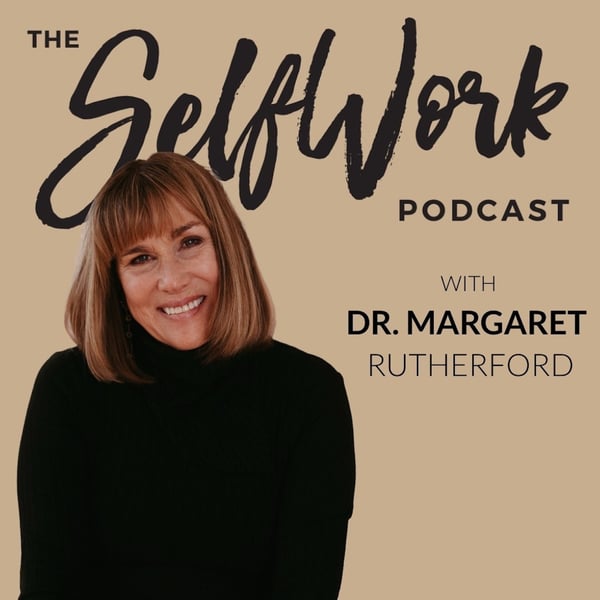455 SelfWork: Is Depression Getting Easier to Talk About
The SelfWork Podcast
Margaret Robinson Rutherford PhD
4.7 • 1.2K Ratings
🗓️ 18 July 2025
⏱️ 25 minutes
🧾️ Download transcript
Summary
Given the wave of mental health awareness that has occurred over the last decade or more, is depression getting easier to talk about?
In some ways, yes. But in other important ways… it doesn’t seem to be. There are plenty of reasons that are the essentially the same as they've been for a while. But there’s one that’s emerged only recently… the idea that a mental illness diagnosis becomes an identity you have. “I’m bipolar, so this is really hard for me.” It can even become your identity or brand on social media.
What about the apparent backlash that’s occurring as a response to mental illness branding? Influencers are labeling themselves as traumatized or using a diagnostic label as their way of selling you something or attracting followers.
How do you know who to trust? Who’s an expert and who isn’t?
The listener voicemail tells a story that I’ve heard fairly often. When one family member takes advantage of their relationship with an older person, a mom, a dad, an aunt or uncle or grandparent, and takes much more than their share of that person’s assets, be it jewelry or money or collections. The rest of the family is aware perhaps but feels helpless, not wanting to press charges or maybe even not knowing how to “prove” manipulation.
Vital Links:
An article on how and why depression is hard to talk about
Advertisers' Links and Special Offers:
Have you been putting off getting help? BetterHelp, the #1 online therapy provider, has a special offer for you now!
Manage your hormones with the help of Happy Mammoth, a leader in women's health! Go to https://happymammoth.com/selfwork to order!
You can hear more about this and many other topics by listening to my podcast, SelfWork with Dr. Margaret Rutherford. Subscribe to my website and receive my weekly newsletter including a blog post and podcast! If you’d like to join my FaceBook closed group, then click here and answer the membership questions! Welcome!
My book entitled Perfectly Hidden Depression is available here! Its message is specifically for those with a struggle with strong perfectionism which acts to mask underlying emotional pain. But the many self-help techniques described can be used by everyone who chooses to begin to address emotions long hidden away that are clouding and sabotaging your current life.
There’s another way to send me a message! You can record by clicking below and ask your question or make a comment. You’ll have 90 seconds to do so and that time goes quickly. By recording, you’re giving SelfWork (and me) permission to use your voice on the podcast. I’ll look forward to hearing from you!
Our Sponsors:
* Check out Happy Mammoth and use my code SELFWORK for a great deal: https://happymammoth.com
Advertising Inquiries: https://redcircle.com/brands
Transcript
Click on a timestamp to play from that location
| 0:00.0 | This is Self-Work, and I'm Dr. Margaret Rutherford. |
| 0:10.3 | At Self-Work, we discuss psychological and emotional issues and what you can do about them, |
| 0:15.6 | whether that's learning self-acceptance, taking action, or seeking therapy or treatment. |
| 0:22.9 | Eight years ago, I extended the walls of my practice to reach those of you who might already be knowledgeable about middle |
| 0:27.1 | health treatment, but also to those of you who might say, you'd never darken the door of a therapist. |
| 0:33.0 | And yet, you are here. I'll answer your questions while I invite you to take a few minutes for your |
| 0:39.1 | own self-work. Please remember trust is earned and before on social media you begin following |
| 0:47.5 | someone or listening to someone's advice before you honor them as an expert, please give them |
| 0:53.1 | time and space to earn that trust. What are they |
| 0:56.6 | saying or doing or suggesting that's truly helpful to you? Do you feel better about yourself |
| 1:01.8 | when you watch or listen? Welcome to this week's edition of self-work. Given the wave of mental |
| 1:09.9 | health and wellness awareness that has occurred over the last decade or more, |
| 1:13.8 | is talking about revealing depression getting any easier? |
| 1:17.8 | In some ways, yes, I think so. |
| 1:20.6 | But in some very important ways, it doesn't seem to be. |
| 1:24.3 | There are plenty of reasons that are essentially the same as they may have been for a while, |
| 1:28.4 | but there's also one that's emerged only recently, the idea that a mental illness diagnosis |
| 1:34.0 | becomes an identity you have. I'm bipolar, so this is really hard for me, for example. It can even |
| 1:40.1 | become your brand on social media. I want to talk about those reasons today. Are we moving |
| 1:46.5 | in a direction where mental and emotional struggles are easier to accept and talk about? What about |
| 1:51.5 | the apparent backlash that's occurring as a response to this kind of mental illness branding? |
| 1:57.6 | Many people labeling themselves as traumatized or using a diagnostic label as their way of selling |
... |
Transcript will be available on the free plan in 1 days. Upgrade to see the full transcript now.
Disclaimer: The podcast and artwork embedded on this page are from Margaret Robinson Rutherford PhD, and are the property of its owner and not affiliated with or endorsed by Tapesearch.
Generated transcripts are the property of Margaret Robinson Rutherford PhD and are distributed freely under the Fair Use doctrine. Transcripts generated by Tapesearch are not guaranteed to be accurate.
Copyright © Tapesearch 2025.

